2022 Summer Success Symposium
August 17, 2022 | 10:00 am-3:30 pm ET | G10 Biotechnology Building
10:00 – 10:15 am ET
Check-In
10:15 am – 10:30 am ET
Welcoming Remarks
Speaker: Sara Xayarath Hernández, Associate Dean for Inclusion and Student Engagement, Graduate School
10:30 am – 12:00 pm ET
Opening Plenary Session: Writing for Healing and Joy – Resisting the Traumatic Experience of the Academic Writing Process
In this session, participants learnt about embedding healing, joy, and wellness into the academic writing process. Through Dr. Villarreal’s experience as a mami-scholar dealing with Generalized Anxiety Disorder (GAD) and depression in the middle of a global pandemic, she developed coping skills influenced by a combination of Chicana feminist teachings, occupational therapy, and consejos from her community. Determined to not allow the dissertation process to be yet another traumatic experience in academia for her, she instead cultivated one that brought her healing and joy. In this session, Dr. Villarreal shared her experience and give guidance on how graduate students can cultivate wellness, joy, and healing along their research and writing journeys.
Speaker: Cynthia Villarreal, Assistant Professor, Northern Arizona University
About Dr. Cynthia Villarreal
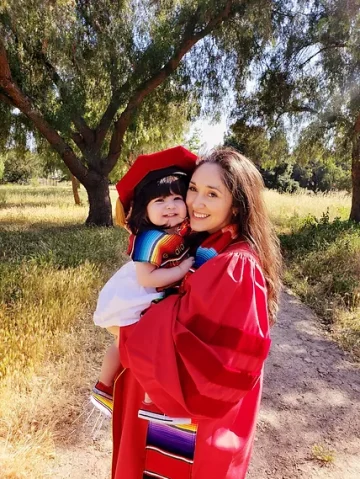 Originally from El Paso, Texas, Dr. Villarreal, her husband, daughter, a senior Chihuahua, traviesa cat, and plantitas most recently relocated from Los Angeles to Arizona. She holds a Ph.D. in Urban Education Policy from the Rossier School of Education at the University of Southern California, and is a fronteriza studying the borderlands of higher education, Hispanic-serving institutions, organizational culture, equity in decision-making, and Chicana feminisms in higher education. She is a qualitative researcher and storyteller. As a creative non-fiction writer, she believes in the importance of sharing counternarratives/countertestimonios to critique and transform higher education. She loves expanding her scholar family and looks forward to engaging with the Cornell graduate community.
Originally from El Paso, Texas, Dr. Villarreal, her husband, daughter, a senior Chihuahua, traviesa cat, and plantitas most recently relocated from Los Angeles to Arizona. She holds a Ph.D. in Urban Education Policy from the Rossier School of Education at the University of Southern California, and is a fronteriza studying the borderlands of higher education, Hispanic-serving institutions, organizational culture, equity in decision-making, and Chicana feminisms in higher education. She is a qualitative researcher and storyteller. As a creative non-fiction writer, she believes in the importance of sharing counternarratives/countertestimonios to critique and transform higher education. She loves expanding her scholar family and looks forward to engaging with the Cornell graduate community.
12:00 – 12:30 pm ET
Lunch
12:30 – 2:00 pm ET
Alumni Keynote Session: Defining and Progressing Toward Your North Star
Graduate school can feel confusing. The process is defined, but vague. It’s structured, but also very individualized. When navigating this process, it can become difficult at times to maintain a sense of agency. Because the constant in all of this is you, it’s critical that you find ways to ground yourself so you don’t lose sight of what you want from this journey. In this session, we discussed how to define your purpose and develop well-aligned goals. In addition, successful strategies for sustaining your passion through graduation and beyond were explored.
Speaker: Elizabeth Wayne, M.S. ’13, Ph.D. ’16 Biomedical Engineering, Assistant Professor, Biomedical Engineering and Chemical Engineering, Carnegie Mellon University
About Dr. Elizabeth Wayne
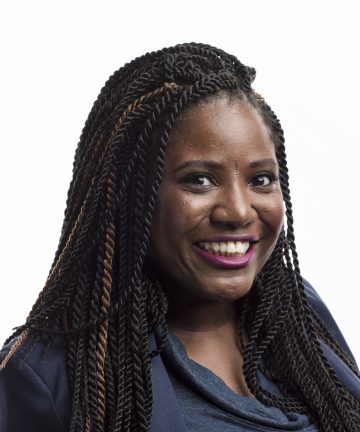
Elizabeth Wayne is an Assistant Professor in Biomedical Engineering and Chemical Engineering. Professor Wayne received her B.A. in Physics from the University of Pennsylvania and M.S. and Ph.D. degrees in Biomedical Engineering from Cornell University. She was subsequently a postdoctoral fellow in the NCI T32 Cancer Nanotechnology Training Program at the University of North Carolina at Chapel Hill in the Eshelman School of Pharmacy working under the supervision of Professor Alexander Kabanov. where she developed adipose tissue engineered models. Her lab at CMU focuses on using macrophages as tools for diagnostic evaluation and drug delivery carriers in cancer and regenerative medicine. Her advocacy has been featured in Nature Medicine and Nature Careers and she is a 2017 TED Fellow.
2:15 – 3:30 pm ET
Mastering Your Transition Into & Progression Through Graduate School
During this panel discussion with current doctoral students from across the disciplines, panelists candidly discussed their experiences and strategies for making a successful transition into graduate school. They also shared insights on their experiences navigating their ongoing progression through their graduate studies, and their exploration and preparation for various postgraduate career pathways.
Moderator: Marguerite Pacheco, Ph.D. Candidate, Biomedical Engineering
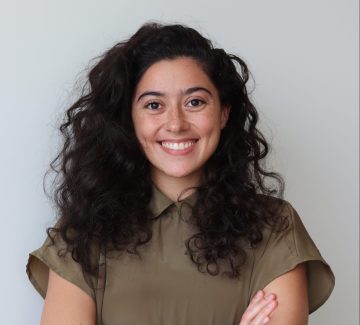 Marguerite is a rising fourth year PhD candidate in the Biomedical Engineering department, studying tendon regeneration and tissue engineering in the Andarawis-Puri lab. Since coming to Cornell, she has been involved in the Latinx Graduate Student Coalition, Graduate Disability+, and pan-Diversity Council events. A desire to increase the accessibility and inclusivity of STEM fields motivated her to be involved in these organizations as well as the Cornell Graduate Biomedical Engineering Society, which provides many opportunities for science outreach and education. She hopes to continue working towards equity within the academic community and greater society as she finishes her PhD and pursues professorship in the field of tissue engineering. Outside of work, she loves soccer, dancing, and perusing queer art.
Marguerite is a rising fourth year PhD candidate in the Biomedical Engineering department, studying tendon regeneration and tissue engineering in the Andarawis-Puri lab. Since coming to Cornell, she has been involved in the Latinx Graduate Student Coalition, Graduate Disability+, and pan-Diversity Council events. A desire to increase the accessibility and inclusivity of STEM fields motivated her to be involved in these organizations as well as the Cornell Graduate Biomedical Engineering Society, which provides many opportunities for science outreach and education. She hopes to continue working towards equity within the academic community and greater society as she finishes her PhD and pursues professorship in the field of tissue engineering. Outside of work, she loves soccer, dancing, and perusing queer art.
Panelists
Drea Darby, Ph.D. Candidate, Entomology
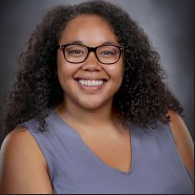 Andrea’s life mission is to empower, encourage, and educate people with her initiatives and engagement in STEM research and mentorship. She is currently a graduate student in the Field of Entomology at Cornell University in Dr. Brian Lazzaro’s lab. Her research interests are in host-microbe interactions using the fruit fly, Drosophila melanogaster, as a model to study this. She has great motivation and passion to contribute to a diverse and inclusive work environment in academia and STEM. Andrea is committed to efforts to encourage underrepresented minorities (URM) to pursue careers in STEM. She dreams to make these spaces feel like a safe environment for people of all backgrounds to feel heard and represented in the academy. Throughout her tenure at Cornell, Andrea will continue to pursue diversity and inclusion while advancing her research program as a budding Drosophila researcher.
Andrea’s life mission is to empower, encourage, and educate people with her initiatives and engagement in STEM research and mentorship. She is currently a graduate student in the Field of Entomology at Cornell University in Dr. Brian Lazzaro’s lab. Her research interests are in host-microbe interactions using the fruit fly, Drosophila melanogaster, as a model to study this. She has great motivation and passion to contribute to a diverse and inclusive work environment in academia and STEM. Andrea is committed to efforts to encourage underrepresented minorities (URM) to pursue careers in STEM. She dreams to make these spaces feel like a safe environment for people of all backgrounds to feel heard and represented in the academy. Throughout her tenure at Cornell, Andrea will continue to pursue diversity and inclusion while advancing her research program as a budding Drosophila researcher.
Héctor Loyola Irizarry, Ph.D. Student, Biomedical and Biological Sciences
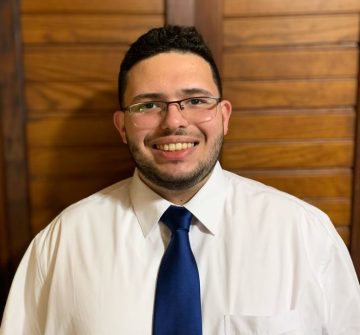
Héctor G. Loyola Irizarry grew up in the small town of San Sebastián, Puerto Rico. Since he was young, Héctor was intrigued by the sciences and had decided to be a biologist, but it wasn’t until he got to high school that he decided to study microbiology. In the summer between his sophomore and junior years, Héctor participated in a summer camp focused on biotechnology called BETTeR-IC+ that was hosted by the University of Puerto Rico – Mayagüez (UPR-M). This summer camp would set in stone his decision to study microbial genetics. Héctor did his undergraduate studies in Microbiology at UPR-M, where he joined the Maximizing Access to Research Careers (MARC) program. Thanks to the MARC program, Héctor was able to perform research at various universities, like the University of Notre Dame, Rutgers University, and UPR-M. These experiences all led to his current position as a Ph.D. Candidate in the Biomedical and Biological Sciences program at Cornell, developing tools to genetically manipulate microbial communities.
Melia Matthews, Ph.D. Student, Biomedical and Biological Sciences
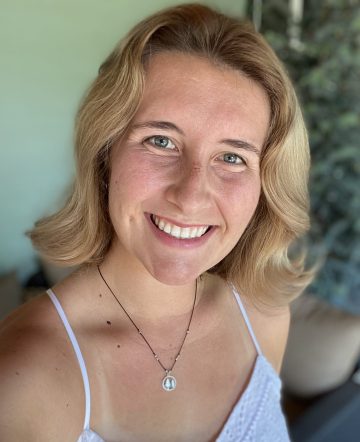 Melia is a rising second year student in Dr. Karl Lewis’ lab in the Department of Biomedical Engineering. Her research is focused on bone homeostasis and mechanobiology, specifically developing a new in vivo imaging technique with Cornell Dots. She is excited to be collaborating with the Wiesner Lab (Materials Science) and the Delco Lab (CVM). She received her Bachelors in Biology from Whitman College in Walla Walla, WA and is originally from rural Northern California. Outside of science, she is passionate about outdoor recreation, especially swimming, skiing, scuba diving, and underwater photography. On campus, she is involved in a number of organizations, including Graduate Women in Science, the Cornell Undergraduate Research Journal, the Graduate and Professional Student Assembly, and the Club Swim Team.
Melia is a rising second year student in Dr. Karl Lewis’ lab in the Department of Biomedical Engineering. Her research is focused on bone homeostasis and mechanobiology, specifically developing a new in vivo imaging technique with Cornell Dots. She is excited to be collaborating with the Wiesner Lab (Materials Science) and the Delco Lab (CVM). She received her Bachelors in Biology from Whitman College in Walla Walla, WA and is originally from rural Northern California. Outside of science, she is passionate about outdoor recreation, especially swimming, skiing, scuba diving, and underwater photography. On campus, she is involved in a number of organizations, including Graduate Women in Science, the Cornell Undergraduate Research Journal, the Graduate and Professional Student Assembly, and the Club Swim Team.
Cristian Rivera, Ph.D. Student, Psychology
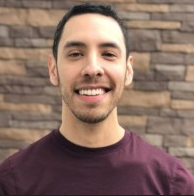 Christian Rivera is currently pursuing a PhD in Psychology at Cornell University. His background is primarily in higher education with teaching experience in psychology (psychological statistics & experimental research design, psychological measurement) and Spanish (beginner through intermediate levels). His My research interests focus on cognitive and linguistic ability; in particular, how memory constraints and statistical regularities in language give rise to the chunking of linguistic information (e.g., chunking sounds to form syllables, syllables to form words, and words to form multiword chunks), which may predict and facilitate language development in both neurotypical and neurodivergent populations. Academic interests include applied statistics and statistical theory, experimental psychology, cognitive neuroscience, cognitive electrophysiology, electroencephalography (EEG), memory, second language acquisition, and technology in language learning.
Christian Rivera is currently pursuing a PhD in Psychology at Cornell University. His background is primarily in higher education with teaching experience in psychology (psychological statistics & experimental research design, psychological measurement) and Spanish (beginner through intermediate levels). His My research interests focus on cognitive and linguistic ability; in particular, how memory constraints and statistical regularities in language give rise to the chunking of linguistic information (e.g., chunking sounds to form syllables, syllables to form words, and words to form multiword chunks), which may predict and facilitate language development in both neurotypical and neurodivergent populations. Academic interests include applied statistics and statistical theory, experimental psychology, cognitive neuroscience, cognitive electrophysiology, electroencephalography (EEG), memory, second language acquisition, and technology in language learning.
Destiny Van, Ph.D. Candidate, Biochemistry, Molecular, and Cell Biology
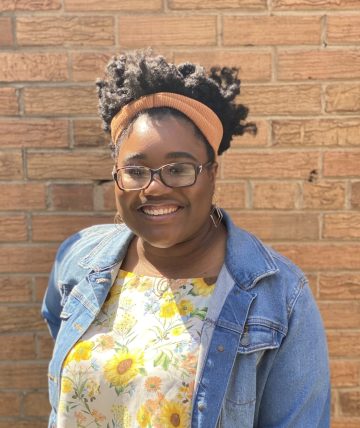 Destiny Van graduated with a B.S. in Biochemistry at Spelman College in Atlanta, GA. She joined the Biochemistry, Molecular and Cell Biology program at Cornell University in Fall 2019. She is a proud member of Dr. Robert S. Weiss’ lab, and her research is focused on studying the role of Sirtuin 5 in breast cancer metabolism and metastasis. Outside of the lab, Destiny is involved in several DEI-based organizations to help shape the academic and social experiences of her peers and younger students to ensure DEI in these challenging spaces.
Destiny Van graduated with a B.S. in Biochemistry at Spelman College in Atlanta, GA. She joined the Biochemistry, Molecular and Cell Biology program at Cornell University in Fall 2019. She is a proud member of Dr. Robert S. Weiss’ lab, and her research is focused on studying the role of Sirtuin 5 in breast cancer metabolism and metastasis. Outside of the lab, Destiny is involved in several DEI-based organizations to help shape the academic and social experiences of her peers and younger students to ensure DEI in these challenging spaces.
